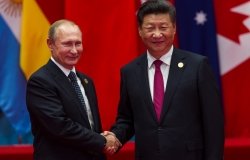Challenges Facing China's Response to AIDS
In New York:David Ho, Director and CEO, Aaron Diamond AIDS Research Center; Peter Piot, Director, Joint United Nations Programme on HIV/AIDS (UNAIDS); Elisabeth Rosenthal, The New York Times, moderatorIn Washington, DC:Bates Gill, Freeman Chair in China Studies, Center for Strategic & International Studies; Sheila Mitchell, Senior VP, Institute for HIV/AIDS, Family Health International; Marwyn Samuels, Founding Chairman, US-China AIDS Foundation
Overview
The use of mass campaigns has been one of the defining characteristics of Chinese Communist Party governance since 1949. Through mobilization campaigns, the Chinese government has effectively encouraged environmental awareness, promulgated family planning policies, and promoted the shift to a market socialist economy. It was then no surprise that once Severe Acute Respiratory Syndrome (SARS) began to spread throughout China, cutting into the country's economic bottom line, the government mobilized the populace through mass campaigns to deal with the public health crisis. However, the speed with which the government undertook necessary policy changes, and the success it had in swiftly suppressing the outbreak (at least temporarily) has surprised some experts.
Many veteran China watchers have asked if this public health campaign offers any lessons for the HIV/AIDS problem. Currently, less than one million HIV cases have been reported in China, which relative to the 1.3 billion population is quite small. The rapid growth of reported cases, however, is quite alarming: Every year since 1999, the number of HIV/AIDS cases has increased by 30 percent. According to estimates, if drastic action is not taken the number of cases could balloon to 10-20 million. At this January 13 meeting—sponsored by the Asia Society, U.S-China AIDS Foundation, and the Asia Program and China Environment Forum—experts convened in Washington and New York for a unique discussion of China's evolving response to HIV/AIDS.
All speakers agreed that rapid progress has been made on HIV/AIDS in China. Indeed, discussions on HIV/AIDS would not have taken place in China even six months ago. Peter Piot noted that though China was slow to attack the HIV/AIDS problem head-on, the government has recently taken steps to deal with present cases and prevent future instances of the disease. Nonetheless, the country still lacks a strong HIV surveillance system and adequate funding for treatment programs throughout the vast country. A liberalized economy in China has also contributed to increased cases of HIV/AIDS infection according to Bates Gill. China's migrant floating population, increased instances of extramarital sex and prostitution, and diminished social services, all contribute to the growing problem. While encouraged by official government pronouncements on the disease, Gill is less sanguine about the actual commitment and resources allotted to prevent a crisis. David Ho reflected on the importance of wide scale testing for HIV. Provided the country maintains an aggressive attitude like that during the SARS outbreak, Ho contended that China stands a good chance of keeping infection rates from spiraling out of control. Because of the stigma still attached to HIV/AIDS and the widespread nature of the disease, nongovernmental organizations (NGOs) are poised to play an important role in prevention and treatment in China. Sheila Matthews noted some of the work being done by domestic and multinational organizations, but also outlined the limitations of NGOs in China; these groups are constrained by questions of legality and insufficient funding. While the SARS scare has heightened public awareness of health issues, Marwyn Samuels insisted that public awareness must be addressed for China to effectively combat the HIV/AIDS crisis. The greatest barriers to propagating messages of prevention and treatment are the lack of money and the increasingly short attention span of the audiences. Mainstream mass media is now almost completely advertiser supported, making it all the more difficult for public health awareness campaigns, like HIV/AIDS, to appeal to advertisers and audiences alike.
Robert Hathaway, Asia Program Director, 691-4012
Drafted by Timothy Hildebrandt, Asia Program Assistant, 691-4057
Hosted By

Indo-Pacific Program
The Indo-Pacific Program promotes policy debate and intellectual discussions on US interests in the Asia-Pacific as well as political, economic, security, and social issues relating to the world’s most populous and economically dynamic region. Read more

China Environment Forum
Since 1997, the China Environment Forum's mission has been to forge US-China cooperation on energy, environment, and sustainable development challenges. We play a unique nonpartisan role in creating multi-stakeholder dialogues around these issues. Read more
Thank you for your interest in this event. Please send any feedback or questions to our Events staff.










